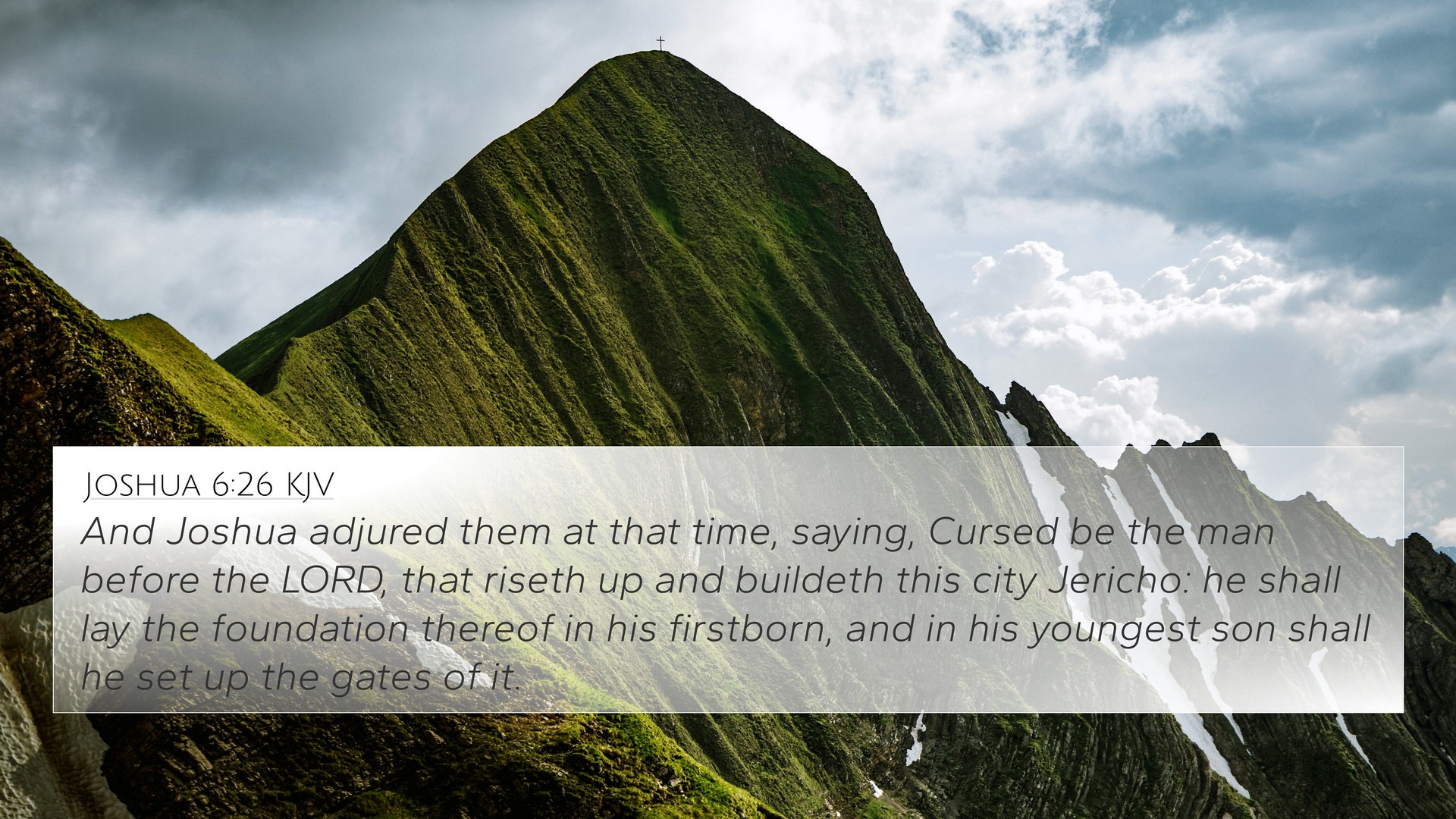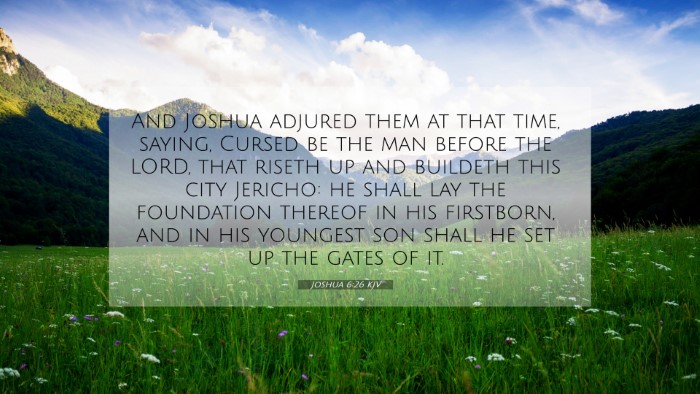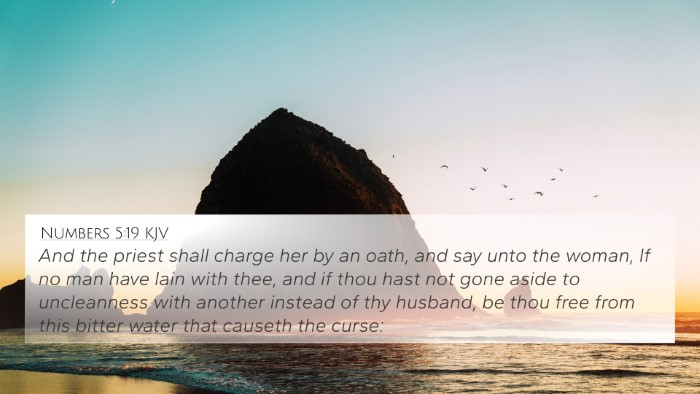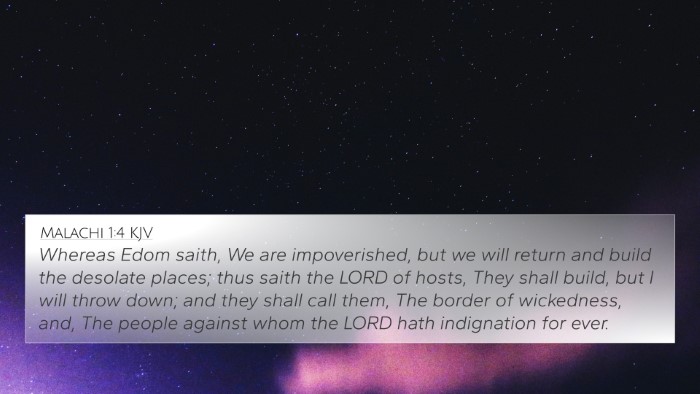Understanding Joshua 6:26
Joshua 6:26 states: "And Joshua adjured them at that time, saying, Cursed be the man before the Lord, that riseth up and buildeth this city Jericho: he shall lay the foundation thereof in his firstborn, and in his youngest son shall he set up the gates of it."
This verse captures a pivotal moment following the miraculous fall of Jericho's walls, where Joshua places a curse on anyone who would attempt to rebuild the city.
Verse Meaning and Commentary Insights
The verse is significant within the narrative of the Israelites’ conquest of Canaan. According to Matthew Henry, Joshua's curse emphasizes the importance of obeying God's directives and the grave consequences of defiance. The destruction of Jericho signals not just a military victory but a divine judgment against the idolatrous practices that the city represented.
Albert Barnes adds that the curse serves as both a prophetic declaration and a spiritual warning. It points to the futility of building what God has destroyed. The act of rebuilding Jericho is viewed as a direct affront to God’s authority. Hence, the curse foretells personal loss for those who defy the divine order, symbolized by the tragic deaths of their sons.
Adam Clarke notes a broader context where the fate of Jericho serves as a theological lesson on the seriousness of obedience to God's word. The specificity of the curse—affecting the builder's firstborn and youngest son—indicates that transgressions against God can have multigenerational repercussions.
Thematic Connections
This verse connects with various Bible themes including judgment, prophecy, and the consequences of disobedience. It illustrates the seriousness with which God regards His commands and the ramifications when they are ignored.
Cross-References for Joshua 6:26
- 1 Kings 16:34: Highlights the fulfillment of Joshua's curse when Hiel of Bethel rebuilds Jericho, losing his sons.
- Proverbs 10:29: Talks about the Lord being the strength of the upright, implying God's protection over those who obey Him.
- Deuteronomy 13:12-16: Addresses the punishment for turning away from God’s commands, echoing themes of fear and consequences.
- Numbers 14:35: Explains that individuals who forsake the Lord will face divine judgment, underscoring the serious nature of disobedience.
- Joshua 7:12: Describes the consequences of Achan's sins against God, highlighting Israel's defeat due to disobedience.
- Revelation 21:8: Provides a warning against unfaithfulness, linking the unrepentant with serious consequences.
- Luke 19:44: Jesus foretells the destruction of Jerusalem, akin to the fate of Jericho when forsaking God.
Comparative Bible Verse Analysis
By examining Joshua 6:26 in light of other scriptures, we appreciate a thematic coherence throughout the Bible concerning obedience and judgment. Each cross-reference reinforces the understanding that divine favor results from faithfulness to God's commands.
Inter-Biblical Dialogues
Interpreting Joshua 6:26 involves recognizing the dialogue between the Old Testament and New Testament teachings. The themes of destruction and justice permeate through to New Testament parables and teachings that echo the fate of those who choose to walk away from God’s commandments.
Tools for Bible Cross-Referencing
For those looking to dive deeper into cross-referencing Biblical texts, consider utilizing tools such as:
- Bible Concordance: Essential for identifying where words and themes appear throughout the Bible.
- Bible Cross-Reference Guide: A helpful resource for exploring the connections between different verses.
- Comprehensive Bible Cross-Reference Materials: Vast sources that systematically document scripture interrelations.
Conclusion
Joshua 6:26 serves not only as a historical account within the Israelite conquest but also as a profound reminder of God’s sovereignty and the serious implications of human actions in relation to divine commandments. The surrounding commentaries provide a rich context, making it essential for anyone studying the Bible to consider the theological layers and implications woven through this verse.









